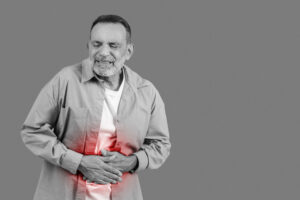
Abdominal pain is one of the most common health complaints, but it’s also one of the trickiest to understand. Sometimes it’s just a passing discomfort after a heavy meal, but other times, it could be a sign of something serious. Knowing when to ignore it, when to rest, and when to seek medical help is essential for your well-being.
This article will help you understand the common causes of abdominal pain, warning signs you shouldn’t ignore, and the right time to consult a doctor.
Why Does Abdominal Pain Happen?
Your abdomen houses many important organs – stomach, intestines, liver, gallbladder, pancreas, kidneys, and more. Pain can occur when any of these organs are irritated, inflamed, or infected.
Common causes include:
- Indigestion or overeating
- Gas and bloating
- Acidity or acid reflux
- Constipation
- Stomach infections
- Gallstones
- Appendicitis
- Ulcers
- Kidney stones
Most mild cases improve on their own with rest, hydration, and a light diet. But if the pain is severe, persistent, or accompanied by other symptoms, it’s time to act.
Warning Signs You Shouldn’t Ignore
While not every tummy ache means trouble, there are certain symptoms that could point to a serious problem:
- Severe, sudden, or sharp pain that worsens quickly
- Pain with fever and chills
- Persistent nausea or vomiting
- Pain with yellowing of the skin or eyes (jaundice)
- Blood in stool or black, tarry stools
- Difficulty breathing or chest pain along with stomach pain
- Pain that spreads to your back or shoulders
- Abdominal swelling or extreme tenderness
If you experience any of these, seek medical help immediately.
When to See a Specialist
You should see a gastroenterologist (a doctor who specializes in digestive health) if:
- Your pain has been ongoing for more than a week
- Over-the-counter medicines don’t help
- You have unexplained weight loss
- You’ve had repeated episodes of abdominal pain
- You have changes in bowel habits along with pain
For the best care, it’s important to consult a trusted expert. If you are in Gujarat, you might want to consider the top 10 gastroenterologist in surat for accurate diagnosis and treatment.
Possible Medical Conditions Behind Abdominal Pain
Abdominal pain can be linked to various digestive and non-digestive health problems:
- Gallstones – Hard deposits in the gallbladder causing sharp pain in the upper right abdomen.
- Appendicitis – Inflammation of the appendix; pain starts near the navel and shifts to the lower right abdomen.
- Gastritis or Ulcers – Irritation in the stomach lining causing burning or gnawing pain.
- Kidney Stones – Severe pain in the sides or lower back radiating to the abdomen.
- Irritable Bowel Syndrome (IBS) – Recurring abdominal cramps with bloating, diarrhea, or constipation.
- Liver Disorders – Pain in the upper right side, sometimes with nausea and fatigue.
- Pancreatitis – Intense pain in the upper abdomen, often after eating.
Tests and Diagnosis
If your doctor suspects a serious issue, they may recommend:
- Blood tests to check for infection or organ problems
- Ultrasound to detect gallstones or other abnormalities
- Endoscopy to view the inside of your stomach
- Colonoscopy for colon-related problems
- CT scan for detailed imaging
Treatment Options
The treatment depends on the underlying cause:
- For indigestion or acidity: Lifestyle changes, light meals, antacids
- For infections: Antibiotics or antiviral medicines
- For gallstones or appendicitis: Surgery may be required
- For ulcers: Medicines to reduce acid and heal the stomach lining
- For kidney stones: Pain management and procedures to break/remove stones
Lifestyle Tips to Prevent Abdominal Pain
While you can’t prevent every cause of abdominal pain, healthy habits can lower your risk:
- Eat a balanced diet rich in fiber, fruits, and vegetables
- Drink plenty of water daily
- Avoid overeating and heavy, oily meals
- Limit alcohol and spicy foods
- Stay physically active
- Manage stress through relaxation techniques
Final Thoughts
Abdominal pain can be mild and harmless, but sometimes it’s a warning sign your body needs urgent attention. Listen to your body — if the pain is severe, persistent, or unusual, don’t delay seeing a doctor. With timely diagnosis and treatment, you can prevent small problems from becoming serious health concerns.
